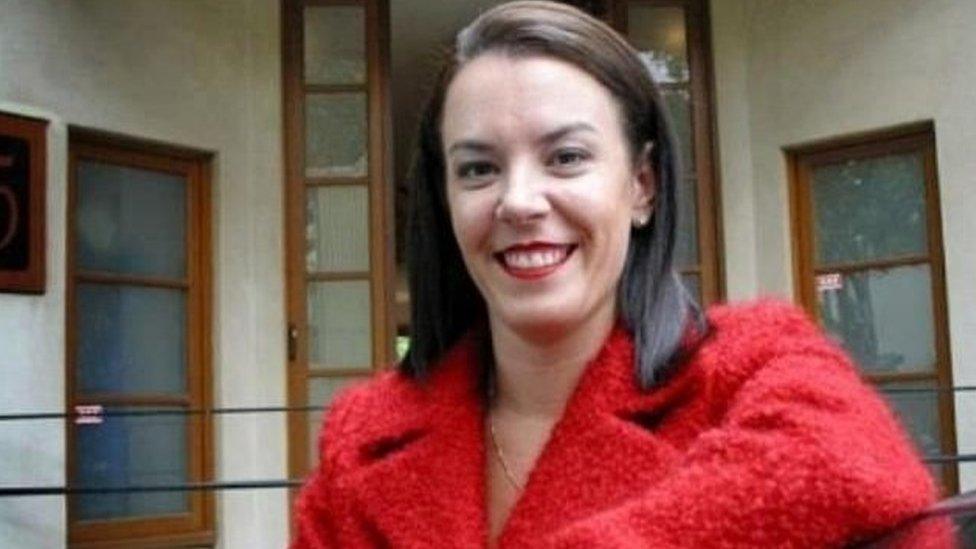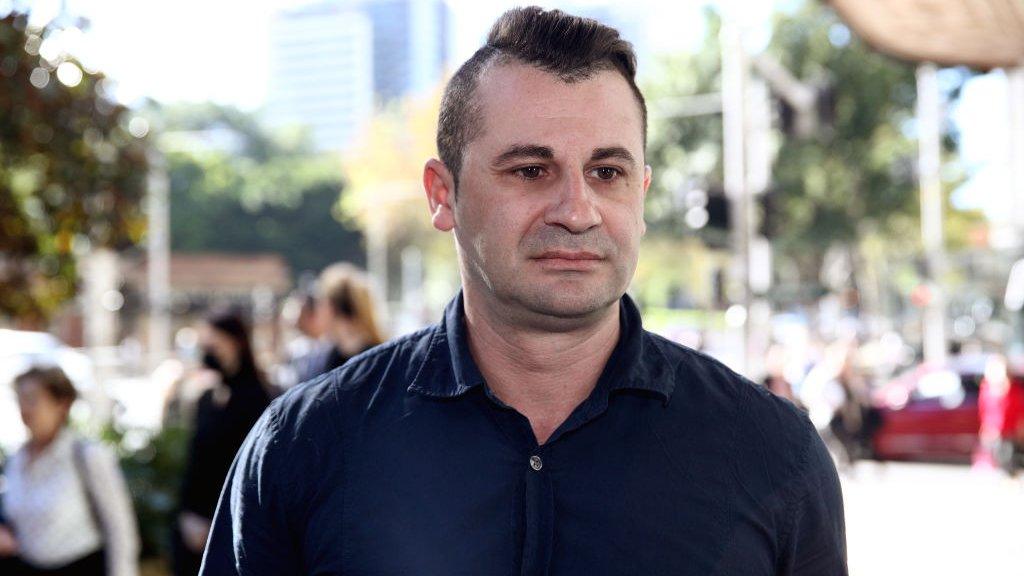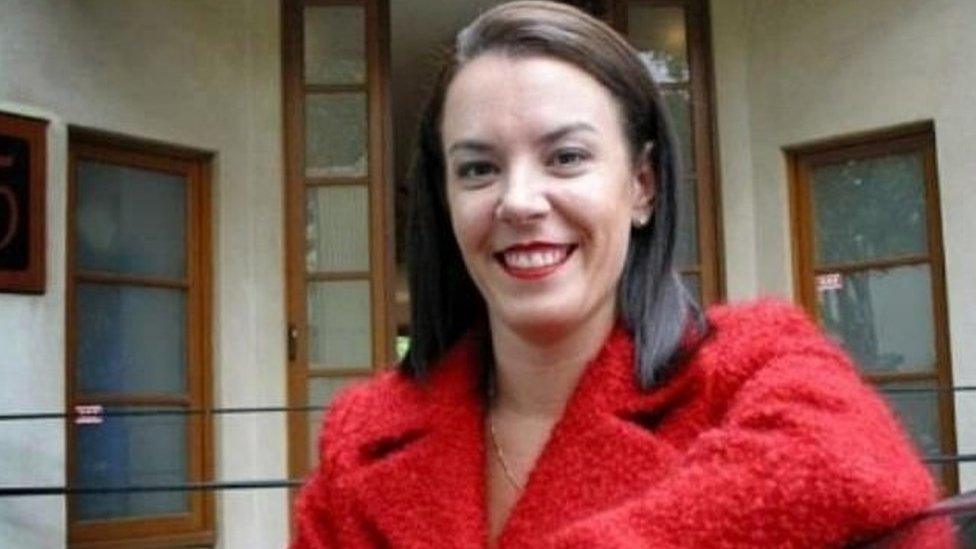Melissa Caddick: Death of Australian fraudster remains a mystery
- Published

Melissa Caddick went missing in 2020 after police agents raided her home
When conwoman Melissa Caddick vanished from her luxurious eastern Sydney home in November 2020 - with only her partially decomposed foot found washed up on a beach months later - it set off a frenzy in Australia.
The case blindsided investors, baffled police, and captured the imagination of a nation.
The fraudster has inspired a hit podcast, a TV dramatisation, and countless outlandish theories - including that she had been swallowed by a shark or had severed her own foot to throw police off her scent.
A long-running inquest into the case heard of a flawed police investigation, conflicting accounts from her husband, and all the extensive speculation surrounding her fate.
But a coroner on Thursday ruled that exactly what happened to her would remain a mystery.
"The conclusion I have reached is that Melissa Caddick is deceased. However... I do not consider the evidence enables a positive finding as to how she died, or when and where this happened," Deputy State Coroner Elizabeth Ryan wrote.
The final morning
For most, the Melissa Caddick story began with the news that the seemingly successful financial adviser was missing.
But her life had actually begun to unravel months earlier when Australia's financial watchdog was tipped off that she had been using a friend's financial adviser's licence, having simply pasted in her own name on the document.
Regulators suspect the 49-year-old stole up to $30m (£15.8m; $19.5m) from more than 60 clients, including many of her family and friends, to help fund a lavish lifestyle.
There were overseas trips on private jets, high-end cars, designer clothes, and expensive jewellery.
Her methods were not "particularly complicated", the coroner said.
As new clients gave her money to invest, she would pay some out as dividends to existing clients before keeping - and spending - the rest.
Coroner Ryan said she was struck by the "powerful impression of wealth and success" Caddick made on her clients and would-be investors.
"Equally significant was the trust they had in her... almost all were either immediate family members, or close personal friends of herself and her family," she said.
One would-be investor recalled: "I wanted to model myself and our family on successful people, and Melissa appeared to be successful".
But everything fell apart on 11 November 2020 when police knocked on her door at dawn.
Conflicting accounts
The last confirmed sighting of Melissa Caddick was by officers at the raid on her home.
Her husband, Anthony Koletti, told police they believed she had gone for an early run the next morning. Her car and all her personal belongings had been left behind.
But she was not reported missing by Mr Koletti for more than 30 hours, and only after he had dialled in to a court hearing that she was due to attend and appeared surprised she had not turned up.
Police initially explored two theories - that Caddick was still alive and had gone into hiding to escape justice, or had taken her own life.
But the inquest heard how Mr Koletti, a hairdresser and part-time DJ, behaved erratically in the wake of his wife's disappearance, leading police to suspect he could be involved.
Mr Koletti has denied any knowledge of his wife's crimes or any involvement in her disappearance, and police say they have uncovered no evidence to dispute that.

Anthony Koletti has denied any knowledge of his wife's crimes
But an investigator told the coroner's court Mr Koletti "didn't appear to be overly concerned" when his wife vanished.
Lead Detective Sergeant Michael Kyneur also said Mr Koletti had visited a cliff top area near their home and taken a photograph of a shoe print, an action the policeman described as "extraordinary".
"That's a dog park. It's like saying I found a footprint on Bondi beach."
The inquest also heard that Mr Koletti had sent texts from Caddick's phone pretending to be her, told police he was "too busy" to attend an interview, and gave conflicting versions of events.
For example, he was able to provide a description of what his wife was wearing on the morning she vanished, despite also saying he had not actually seen her, police said.
Mr Koletti had also recounted his version of events by releasing a musical concept album containing tracks with titles such as "Melissa Is Missing" and "Above the Law".
It was "regrettable" that Mr Koletti had not given a "full and frank" account of what had happened, Magistrate Ryan said on Thursday.
Investigation criticised
The case took a grisly twist in February 2021 with the discovery of a rotting, trainer-clad foot on a remote beach 500km (310 miles) south of Sydney.
Experts matched the body part to Caddick through DNA, but an autopsy couldn't determine if it was separated by force or decomposition.
The inquest heard a slew of theories to explain how it ended at Bournda Beach, including that a shark ate and later regurgitated body parts.
Police even considered throwing pig carcasses with running shoes on their trotters into the sea to determine how shark behaviour or ocean currents could have played a role, the inquest heard.
An orthopaedic surgeon told the inquest it was unlikely Caddick could have severed her own foot, as it would require "significant force" to cut through bone, cause major blood loss, and require specialist post-surgical care.
But scientists put forward a simple explanation at the inquest.
Oceanographers said currents could have easily carried the foot that distance, while a pathologist described how human feet can detach from bodies during decomposition.
The inquest also heard criticism of police handling of the case.
Officers assigned to the Caddick case stuck too closely to their view that she had voluntarily vanished, some said.

Police combed the cliffs in Dover Heights for any trace of Ms Caddick
A crime scene examination of the house was not done until 19 days after Caddick disappeared, and a lawyer assisting the coroner questioned why the homicide squad wasn't brought in immediately, if only to rule out foul play.
Another detective expressed surprise that NSW Police only sought out the corporate watchdog's affidavit on Caddick - which outlined its case against her - some months after her disappearance.
The inquest was also told that Caddick had a life insurance policy, which included suicide cover, and had made a number of references to ending her life over the years - but police initially devoted limited resources to this line of inquiry.
Magistrate Ryan on Thursday said the uncovering of Caddick's deception may have triggered a "narcissistic injury", with the illusion of her wealth and success shattered.
"The Asic investigation and search warrant very likely caused her a catastrophic level of shame and despair," she said.
"She may well have reached the conclusion that ending her life was the only option."
But the manner of her death will ultimately remain unresolved, she said.
Equally unresolved are the losses of her clients, many of whom saw huge sums of money vanish.
"I sold my business as I was under the impression my money was safe, and I retired in 2017," one victim testified.
"To rub more salt in the wound she has also stolen my mother's money, wife's, mother-in-law, son, brother and sister… wiping out three generations of my family's savings."
Related topics
- Published26 February 2021
